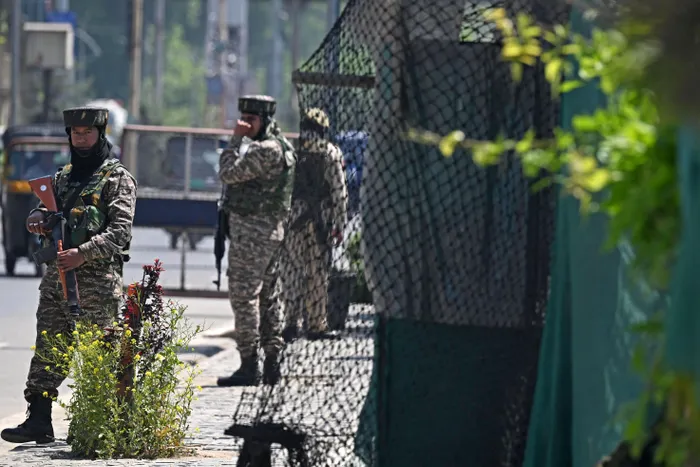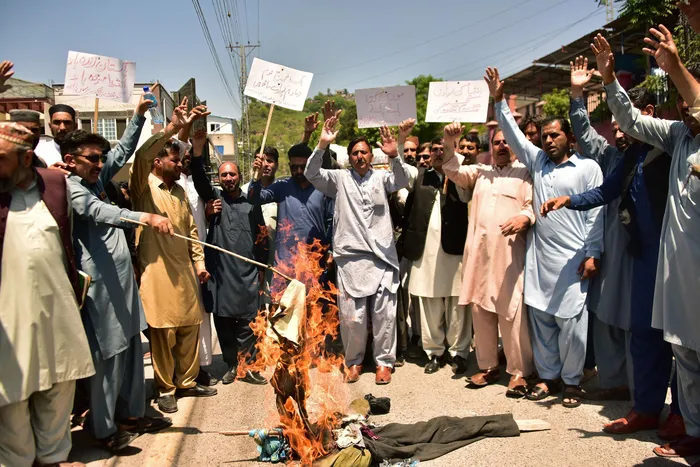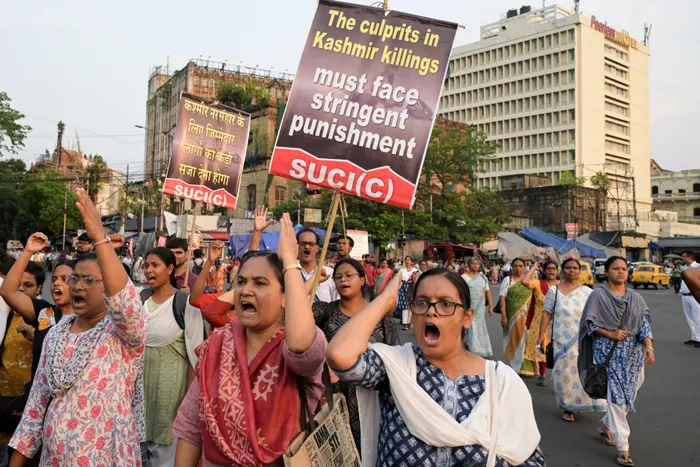
Indian paramilitary troopers stand guard along a street in Srinagar this week. Indian Prime Minister Narendra Modi has given the military "operational freedom" to respond to a deadly attack in Kashmir that New Delhi has blamed on arch-rival Pakistan.
Image: Tauseef MUSTAFA / AFP
Shams Irfan, Karishma Mehrotra
The armored vehicles came at dusk as families were preparing dinner. Two days earlier, gunmen had killed 26 people, most of them tourists, in a remote Himalayan meadow. Now hundreds of Indian soldiers descended on this tiny village, hunting for suspects.
They encircled the home of Adil Hussain Thoker, one of the militants accused of carrying out the attack, forcing villagers into the surrounding rice fields as darkness fell. At midnight, a thunderous blast ruptured the silence - “the earth shook beneath our feet,” recalled one local, speaking like others in this story on the condition of anonymity because he feared for his safety. The two-story brick and wood house was reduced to rubble.
Indian officials say they are carrying out controlled demolitions of homes where explosives have been found. Thoker’s family members vehemently deny the charge and say they haven’t seen or heard from Adil since 2018.

Demonstrators shout slogans and burn an effigy of India's Prime Minister Narendra Modi during an anti-India protest in Muzaffarabad, the capital of Pakistan-administered Kashmir, this week. Pakistan's military shot down an Indian drone along the de facto Kashmir border, a week after the deadliest attack on civilians in the contested region in years.
Image: Sajjad Qayyum / AFP
“What happened in Pahalgam is gruesome, and no sane person would endorse such an act,” said a young boy in Guree, referring to the deadly militant attack on April 22. “But why punish civilians?”
That question encapsulates a familiar dread in Kashmir, where people have long felt trapped between India and Pakistan - which each administer different parts of the Muslim-majority territory but claim full ownership - and between militancy and militarization.
Kashmiris say they are cornered by a cruel paradox: forced to publicly condemn the violence even as they are made to bear the cost. In the face of an intensifying Indian security crackdown, grief for the dead is hardening into fear.
No group has claimed responsibility for the attack in Pahalgam. Indian Foreign Secretary Vikram Misri told reporters Wednesday that militants had “cross-border linkages,” a reference to archrival Pakistan. Islamabad has condemned the killings and rejected claims of involvement.
“Kashmiris now and then have always realized that they are the biggest victim - both of the terrorism and the militarization,” said Anuradha Bhasin, managing editor of the Kashmir Times. “Yet they are always put on the dock and asked to prove their innocence.”

Activists from Social Unity Center of India shout slogans to condemn the recent attack on tourists at Pahalgam, during a rally in Kolkata on this week.
Image: DIBYANGSHU SARKAR / AFP
A ‘people’s peace movement’
As news broke of the attack, the deadliest on Indian civilians in more than a decade, political leaders here issued swift condemnations. Mosques held prayers for the victims. Local associations organized peace marches and candlelight vigils.
Storefronts shuttered, traffic fell silent and schools were closed. Kashmir’s leading newspapers printed black front pages. Unlike during past strikes and shutdowns that targeted the Indian government, the outcry this time was directed at the attackers.
“It’s not for our daily bread that we cry, it is for our humanity,” one protester told journalists. “They must be caught and given the strictest punishment,” another said to the cameras.
“There seems to be an emergence of a spontaneous, genuine people’s peace movement,” said Haseeb Drabu, a former Kashmiri finance minister.
There has been little room for open dissent since 2019, when the government of Indian Prime Minister Narendra Modi revoked Kashmir’s semiautonomous status, jailed scores of activists and journalists, and imposed a months-long communications blackout - sealing the valley off from the world.
In the years since, rights groups have documented widespread abuses by Indian security forces, including arbitrary detentions and extrajudicial killings. The Indian government denies the allegations.
Many Kashmiris saw the attack in Pahalgam as a calculated assault on the region’s identity. An editorial in the Greater Kashmir newspaper said it threatened to “unravel years of progress,” especially when it came to the resurgent tourism industry, touted by the Indian government as symbolic of a new, more peaceful era.
“Tourism has been pushed as a political solution in the absence of adequate security arrangements,” said Nitasha Kaul, a professor of politics and international relations at the University of Westminster. “Those in charge have displayed a callous complacency that suggests they bought into their own superficial rhetoric of ‘normalcy.’”
Abdul Wahid Wani, leader of an association of pony handlers that helps tourists explore the local scenery on horseback, was among the first on the scene after last week’s attack. The carnage he saw is still with him, he said, recalling a newlywed forced to mourn her husband on their honeymoon.
He called for “severe punishment so that generations to come will learn from it.” But, he added, “those who are not at fault should not be entangled in the oppressive punishment.”
Yet there are already signs of “collective punishment,” Bhasin said.
Thoker’s former residence was among nine homes destroyed by Indian security forces, and at least 2,000 people have been detained, according to local reports. At least 60 house raids have been carried out - some trailed by television cameras - and new military checkpoints have been set up across the region. The gunmen accused of carrying out the attack have so far eluded capture.
A statement from police in Srinagar, the largest city in Indian-administered Kashmir, said officers were working to “dismantle terror-supporting infrastructure” by seizing weapons, documents and digital evidence.
“Punish the guilty, show them no mercy but don’t let innocent people become collateral damage,” Jammu and Kashmir’s chief minister, Omar Abdullah, posted Sunday on X.
Kashmiris “felt the need to convey a message to the entire world that Kashmir does not endorse civilian killings, but now they can’t protest their own pain,” said Gowhar Geelani, the author of “Kashmir: Rage and Reason.”
Calls for revenge
The Pahalgam attack has set off a wave of anger on Indian news channels and social media - sometimes directed not just at Kashmiris, but at Muslims more broadly.
“Kashmir should be flattened like Gaza,” the Stop Hindu Hate Advocacy Network posted on X. On the night of the attack, Arnab Goswami, an influential right-wing anchor, headlined his segment with the hashtag #WeWantRevenge, declaring that April 22 was for Indians what Oct. 7, 2023, was for Israelis.
Activists have reported attacks on Kashmiri students in Nagpur and Chandigarh; in Uttarakhand, a Hindu nationalist group posted a video last week warning that “if we see any Kashmiri Muslim in the state after 10am tomorrow, we will give them the right treatment.”
On the outskirts of New Delhi, a Kashmiri college student quickly created a WhatsApp group for more than 100 classmates so they could share updates on revenge attacks and discuss whether it was safe to remain in the country.
“Most of us would have left right after the attack had our end-of-year exams not been this week,” said Sameer, a member of the group, speaking on the condition that he be identified only by his first name. “We are scared, but we also can’t afford to ruin our careers.”
The region is now bracing for India’s next move, fearing a military response against Pakistan could bring the nuclear-armed rivals to the brink of war.
Officials in New Delhi have reported multiple violations along the Line of Control, the heavily militarized border that separates Indian- and Pakistan-administered Kashmir, and that has been largely calm since a tenuous ceasefire was struck in 2021.
Both countries have shut land crossings, slashed embassy staff and ordered hundreds of their citizens to return home. India has suspended its participation in the Indus Waters Treaty, a key water-sharing arrangement with Pakistan, while Islamabad has withdrawn from the Simla Agreement - a 1972 framework for resolving disputes bilaterally.
It was yet another chapter in an “endless cycle” of “India versus Pakistan and Hindu versus Muslim narratives,” said Kaul. “But in order to find any long-term solution, the focus of attention should be Kashmiri lives affected by the unresolved conflict.” | The Washington Post
Mehrotra reported from New Delhi.